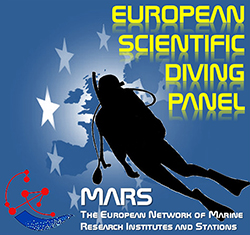– Legal status of scientific diving
Scientific diving in Germany includes all diving activities in a professional scientific context. Besides diving for environmental science, it also includes nature and cultural heritage protection, diving operations in the fields of journalism and engineering, diving assignments within the scope of student research and thesis projects as well as freelance diving assignments with scientific objectives.
Scientific divers must provide proof of the qualification “Geprüfter Forschungstaucher / Certified Research Diver” based on the national rules for scientific diving “Einsatz von Forschungstauchern / Operation of Scientific Divers” DGUV R 101-023 within the framework of SGB VII state law. The German Commission for Scientific (KFT) issue the equivalence certificate “European Scientific Diver” base on the national certificate “Geprüfter Forschungstaucher / Certified Research Diver” and accepts ESD / AESD certificates issued by statutory members of the ESDP (https://www.esdpanel.eu/esdp-membership/).
– Medical examinations
Medical examinations obtained in other countries apply also in Germany, as long as they comply with the national level of scrutiny (Vorsorge nach Grundsatz V 31 „Taucharbeiten“). Medical examinations for scientific diving may be issued for up to 36 months depending on the results of the medical examination. Most medical examinations are issued for 12 months.
– Insurance
All employees in Germany are covered by the statutory accident insurance by law throughout the duration of the contract. In all other cases (e.g., a scientific diver without a contract), the scientific diver needs to get insured by the statutory accident insurance on a private basis.
– Decompression issues
According to the German regulations, dives requiring decompression stops (not a safety stop) have to be done surface supplied.
– First Aid
Scientific divers must hold a valid first aid (CPR) qualification not older than 2 years. Dive mission leaders are asked to renew this qualification every year. All members of a scientific dive team must be trained for the first aid equipment available on site, including normobaric oxygen treatment.
– Scientific Diving Procedures
Routine scientific dive operations in Germany are performed in teams of 3 (4) scientific divers with a dive mission leader, a signal person (can be in personal union with the dive mission leader depending on the complexity of the dive), a safety diver and a mission diver. Most scientific dives are done tethered with surface communication. For any scientific dive mission, a thorough risk assessment has to be done by the dive mission leader following the safety procedures defined in the national rules “Einsatz von Forschungstauchern / Operation of Scientific Divers” DGUV 101-023.
– Breathing gas
There is no overall depth limit for scientific diving in Germany. The maximal depth of a scientific dive has to be defined by the dive mission leader according to the experience and training status of the entire dive team and the associated risk assessment. Scientific diving with compressed air is limited to a maximum depth of 50 meters but it is recommended to use alternative breathing gases for dives deeper than 30 m.
– Volunteers
Volunteers in the sense of “sport divers” or divers without a valid accident insurance are not accepted.
– More information
Scientific diving in Germany is coordinated by the professional association for scientific diving “Kommission Forschungstauchen Deutschland (KFT)” (http://www.forschungstauchen-deutschland.de/index.php/en/) in close cooperation with the “German examination committee for scientific diving” within the framework of the German statutory accident insurance (https://www.bgbau.de/) and the Federal Ministry of Education and Research (https://www.bmbf.de/en/index.html).
For contact addresses see http://www.forschungstauchen-deutschland.de/index.php/en/information-en/members
